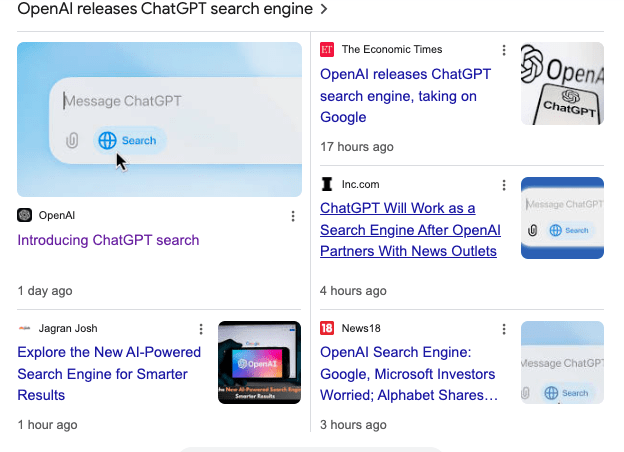The Rise of Open AI’s Chat GPT as a Search Engine
Introduction
In the digital age, the way we seek and process information has undergone a seismic shift. Traditional search engines like Google have long dominated the landscape, offering a vast repository of information at our fingertips. However, with the advent of advanced AI technologies, particularly OpenAI’s ChatGPT, a new paradigm is emerging. ChatGPT is not just a chatbot; it’s evolving into a powerful tool that can transform how we interact with data and retrieve information. In this blog, we will explore the advantages and disadvantages of using ChatGPT as a search engine, how to use it effectively, and its potential future.
Advantages of Using ChatGPT as a Search Engine
1. Conversational Interface
One of the most significant advantages of using ChatGPT as a search engine is its conversational interface. Unlike traditional search engines that return a list of links, ChatGPT engages users in a dialogue. This can make the search experience more intuitive, allowing users to ask follow-up questions and clarify their queries in real-time. This conversational dynamic can lead to more precise and relevant results.
2. Contextual Understanding
ChatGPT’s ability to understand context is another key benefit. Traditional search engines often rely on keyword matching, which can lead to ambiguous results. In contrast, ChatGPT can interpret the nuances of a query, enabling it to deliver more tailored responses. For example, if a user asks about “apple,” ChatGPT can discern whether they are referring to the fruit, the tech company, or the music label based on previous interactions.
3. Enhanced Learning Opportunities
ChatGPT can serve as a learning assistant. Users can ask questions to gain deeper insights into complex topics, facilitating a more interactive learning experience. This capability is particularly beneficial for students and professionals seeking to expand their knowledge without sifting through countless articles or videos.
4. Immediate Answers
The immediacy of responses is another advantage. ChatGPT can provide quick answers to specific questions, which is particularly useful for those who need information on the go. Instead of navigating through multiple pages of search results, users can receive concise, informative responses directly from the AI.
5. 24/7 Availability
Unlike human experts, ChatGPT is available around the clock. This constant accessibility means that users can seek information at any time, making it a valuable tool for those in different time zones or with unconventional schedules.
Disadvantages of Using ChatGPT as a Search Engine
1. Accuracy Concerns
Despite its advantages, there are significant accuracy concerns with using ChatGPT as a search engine. The model can sometimes produce incorrect or misleading information. While it can generate plausible-sounding responses, it lacks the ability to verify facts in real-time, which can lead users astray if they rely solely on its output.
2. Limited Scope
ChatGPT is limited by the data it has been trained on. While it can provide information on a vast range of topics, its knowledge base has a cutoff date, which means it may not have the latest updates or trends. For instance, if users are looking for information on recent events or technological advancements, they might not find accurate results through ChatGPT.
3. Lack of Sources
Traditional search engines often provide links to original sources, allowing users to verify information and explore further. In contrast, ChatGPT may not always cite sources for its responses. This lack of transparency can be problematic for users who prioritize fact-checking and source verification in their research.
4. Over Reliance on AI
As AI tools become more integrated into our daily lives, there’s a risk of overreliance. Users might begin to trust ChatGPT without critical evaluation of the information provided. This could lead to a diminished capacity for independent research and critical thinking skills.
5. Ethical Considerations
The use of AI in information retrieval raises ethical questions. Issues such as data privacy, bias in AI responses, and the potential for misuse of AI-generated content are all areas of concern. Users must remain aware of these implications as they incorporate ChatGPT into their search habits.
How to Use ChatGPT Effectively as a Search Engine
1. Formulate Clear Questions
To maximize the effectiveness of ChatGPT, users should formulate clear and specific questions. Rather than asking vague queries, providing context can help the AI generate more relevant responses. For example, instead of asking “Tell me about climate change,” a more specific query would be “What are the main causes of climate change and its impact on coastal cities?”
2. Engage in Dialogue
Utilize ChatGPT’s conversational capabilities by engaging in a back-and-forth dialogue. If the initial response doesn’t fully address your query, ask follow-up questions or request clarification. This iterative process can lead to more comprehensive answers.
3. Verify Information
Always cross-check the information provided by ChatGPT with reputable sources. While it can be a helpful starting point, users should approach its responses with a critical mindset, especially for important decisions or complex topics.
4. Utilize Its Learning Potential
Use ChatGPT as a learning tool by asking it to explain concepts, summarize articles, or provide examples. This can help reinforce understanding and make the learning process more interactive.
5. Explore Multiple Queries
Don’t hesitate to explore a topic from various angles. By asking multiple related questions, users can gain a more rounded understanding of the subject matter. This strategy can uncover insights that might not emerge from a single query.
Click Here to Launch Open AI Chat GPT Search Engine
The Future of ChatGPT as a Search Engine
As we look ahead, the integration of AI like ChatGPT into search engine technology is poised for significant growth. Here are some trends and potential developments to consider:
1. Improved Accuracy and Verification
Ongoing advancements in AI technology will likely enhance the accuracy of responses. Future iterations of ChatGPT may incorporate real-time data verification systems, allowing it to pull in current information and validate facts more effectively.
2. Enhanced User Personalization
AI will continue to evolve toward greater personalization. Future iterations could tailor responses based on individual user preferences, past interactions, and learning styles, making the search experience even more relevant and engaging.
3. Multi-Modal Capabilities
As AI progresses, we can expect multi-modal capabilities where users can interact with ChatGPT not just through text, but also through voice, images, and possibly other forms of media. This will create a richer and more dynamic search experience.
4. Integration with Other Technologies
The integration of ChatGPT with other emerging technologies, such as virtual reality (VR) and augmented reality (AR), could revolutionize how we access and interact with information. Imagine searching for information about a historical site and being able to explore a virtual replica while receiving real-time contextual data from ChatGPT.
5. Ethical AI Development
As AI technologies become more prevalent, there will be increased scrutiny on ethical considerations. The future will likely see a stronger emphasis on developing responsible AI, with measures in place to address bias, data privacy, and transparency.
Also Read:
- Singham Again Reviews – Movie Box Office Collection
- Bloody Beggar Review – Dark Comedy or Cringe?
- Bagheera 2024 – Reviews, Trailer, Book Tickets
- Bhool Bhulaiyaa 3 and Singham Again Banned in Saudi Arabia – Know the Reason
Conclusion
Open AI’s Chat GPT represents a transformative shift in how we approach information retrieval. While it offers numerous advantages, such as a conversational interface, contextual understanding, and immediate answers, users must remain aware of its limitations, including accuracy concerns and the potential for overreliance. By understanding how to use ChatGPT effectively and critically engaging with its responses, users can harness its power while navigating the evolving landscape of AI in search engines.
The future holds exciting possibilities for ChatGPT and similar AI technologies, with advancements likely to improve accuracy, personalization, and user engagement. As we continue to explore the intersection of AI and information retrieval, one thing is clear: the way we search for and interact with knowledge is on the brink of a remarkable transformation.

Shubhangi Gupta is a distinguished content writer and the visionary founder of The Unpleasant – Acha Nahi Sabse Sacha. With a Master’s degree in Commerce from University of Lucknow, Shubhangi has seamlessly blended her academic background with her passion for reading and writing, embarking on a successful career as a content writer since 2019.






One thought on “Open AI ChatGPT Search Engine Lanuched – Direct Link”